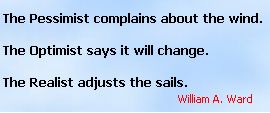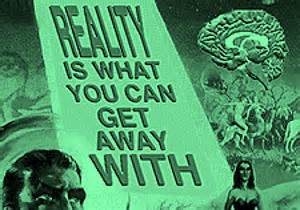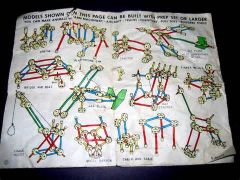(New Instrument of Threes)
- page fifteen -
(The Study of Threes)
http://threesology.org

With a cursory reading, the above three rules seem quite rational, logical, and also empirically based. With reflective reading, an older person might well think that numbers 1 and 3 might well be switched and that there are exceptions such as not asking since your idea may be so unique that someone else will want to take charge of it as their own. In short, a given rules-of-thumb set can be viewed as highly accurate, while from another perspective they are not. Trouble arises when one's perspective differs so much so from everyone else's that the logic used in defense of one's perspective is of the same "radical" logic with which one is interpreting the standard rules.
If one's radical perspective can not be placed into an illustrative context that those observing certain rules can be guided into seeing the same and that the difference is better or at least not thought to be appreciably threatening, then one may have to find a receptive audience (if one exists), outside the social/cultural order one is typically involved with. For examples, one's friends, co-workers, family, relatives or neighbors may be insufficiently able to fully appreciate your perspective. No matter what you may think of feel about them in a positive way, they may not be best for encouraging, supporting, and helping you to fully develop the person you can be.
Their practiced Empiricism, based on personal experiences of perceived examples of superstition, rationalizes the constructed ideology of an existing purer form of thinking like a river they can live nearby and be all the more mentally refreshed by drinking entirely of its waters. The problem is, humanity is not made to live in such a river, pond, lake, stream, puddle or ocean. And no matter what analogy we might want to use to portray the notion of a reality with formal laws which predicate the existence of an underlying, overlaying, or inter-meshing logical structure; if we humans are not already part of the structure, then a total "immersion" in these presumed "waters of logic" have a purity, a sweetness, a clarity, that we may only imagine and never really consume for some individually defined "enlightenment".
In the foregoing sense of this isolation from a pure realization of Rationalism, which supersedes the perceived "Natural laws" predicated from the vantage point on this planet, in this solar system, within this galaxy; then all truths are functionally- used limitations called constants. A purer logic, like a cleaner glass of water, is era-specific. For example, the well-water of 300 years ago might well be viewed as cleaner than the stream water where people are bathing and using the toilet, but it too might well be viewed as unclean and unhealthy by today's standards of clean water. Thus will our "enlightened" logic be seen as irrational when viewed 300 years from now.

For those of us who already see the present as an Age of Irrationality, it is difficult to tell those clinging to Academic standards, much less a "common, non-academic" person, that the logic to which they aspire to is akin to drinking unfiltered well-water that is between the outhouse and one's living quarters. If the traditionally used "Rationalist Vs Empiricist" dichotomy is found to be a type of intellectual's seaside resort with a seafaring membership too snooty for one's tastes, one might adopt a three-part "adrift on the social ocean" convention which looks numerically superior but actually sports a 1 + 1 in the sense of presenting an inherent dichotomy superseded by another perspective. The dichotomy in this example is the pessimist/optimist representation.

Currently, as it was in the past, all businesses, governments and religions are based on systems of rationalization. The rationalization is projected onto the public by varying forms of illusion, which create artificial social environments of beliefs supported by a collective system of rationalism and empiricism; many of which become standardized into truths which may in turn develop into practiced systems of social interaction, expectation and requirement in order to be accepted into a given system of organization.
There are three (aforementioned) reactions a person can develop in response to such:

- A person must agree with the adopted standards of belief:
- Like an animal that submits, or
- Like a person institutionalized, or
- Like someone seemingly "frozen" in place.
- A person must flee from the adopted standards of belief, like an animal that
runs away.
- A person must fight against the adopted standards of belief. Like an animal that challenges some (perceived) reigning authority.
- A person must flee from the adopted standards of belief, like an animal that
runs away.
- Most people go along with the rules because it enables them to secure some reasonable level of livelihood without inviting too much antagonism from those well-meaning others who want them to stay on a (set theory) road of the right way.
- Many people resort to flight in a variety of forms such as permitting themselves
to be absorbed in family life, civil activity, artistic expression, or other social
 activity, which, for the most part, submits to the "laws of the land". Others
prefer to flee into their own world which may or may not include others who share the
same views. And still others flee into another location such as a city, state,
or country. But some choose to escape a person or place thought to be driving them
crazy, by taking another job, indulging in criminal activity, sexual promiscuity,
going to night-clubs as a ritualized behavior, defacing one's body in an artistic
attempt to express individuality, intoxication, diving into a religious retreat
or social commune, etc...
activity, which, for the most part, submits to the "laws of the land". Others
prefer to flee into their own world which may or may not include others who share the
same views. And still others flee into another location such as a city, state,
or country. But some choose to escape a person or place thought to be driving them
crazy, by taking another job, indulging in criminal activity, sexual promiscuity,
going to night-clubs as a ritualized behavior, defacing one's body in an artistic
attempt to express individuality, intoxication, diving into a religious retreat
or social commune, etc... -
 For those who fight with varying forms of rebellion, those who are involved
with the counseling of such individuals, must assist them in directing their
rebelliousness in constructive and not destructive ways. The rebellious energy must
be directed along a channel which enables self-expression but in a tactful way and
not be used as a chip on one's shoulder. For example, being a canvas-directed artist
expressing an unconventional artistry does not give the person the unconventional
right to hit someone over the head to force them to take notice of their work.
Most artists, like most sports players, and like most people in all activities, do
not acquire immense fame nor immense fortune. In other words, they do not become
immersed in notability nor wealth. Indeed, all the presumed "truths" being expressed
by one's rebelliousness against perceived wrongs can be one's own worst enemy if
it is not confronted by the person themselves.
For those who fight with varying forms of rebellion, those who are involved
with the counseling of such individuals, must assist them in directing their
rebelliousness in constructive and not destructive ways. The rebellious energy must
be directed along a channel which enables self-expression but in a tactful way and
not be used as a chip on one's shoulder. For example, being a canvas-directed artist
expressing an unconventional artistry does not give the person the unconventional
right to hit someone over the head to force them to take notice of their work.
Most artists, like most sports players, and like most people in all activities, do
not acquire immense fame nor immense fortune. In other words, they do not become
immersed in notability nor wealth. Indeed, all the presumed "truths" being expressed
by one's rebelliousness against perceived wrongs can be one's own worst enemy if
it is not confronted by the person themselves.

I have encountered very many people who see with a greater clarity than one or more established truths placed into a practice of social illusion. Acknowledging such a truth sets them free from those burdens of living in the shadows of a perspective others indulge in. Some use the clarity of their new-found truth as a proffered tool to gain the intellectual or emotional upper hand on one or more others, typically through some form of salesman/person-ship such as preaching, teaching, or bleating. While not all use their acquired value of "higher" truth-knowledge for taking advantage of someone appendaged with a lack of concern for their welfare, the point is that such people have a positive response to a new-found truth.
Yet, some become highly distraught the more clearer they begin to see one or more truths based on a different Rationalism and Empiricism than those they have encountered personally. When old truths are found to be wanting though they were encouraged by family, or friends, or neighbors, or relatives, or co-workers, or church members, or through some medium such as a book, radio program, television show, etc.; such a realization may result in anger and out-right defiance. Their rebelliousness against the now perceived false truths they have been subjected to, might well force them into exhibiting characteristics resembling a person trying to squirm out of a perceived straight jacket. But for all their efforts, most only hurt themselves because they react emotionally instead of thinking themselves out of their predicament. Some even resort to self-medication such as with drugs, alcohol or taking unnecessary risks. Others turn their anger inward and attempt suicide or engage in some level of body mutilation that is frequently socialized into concealment with some form of jewelry, haircut extravagance or tattoo. When they seem unable to remove themselves physically from a particularly undesirable situation, they resort to one or another acts of trying to alleviate the mental pain of what they perceive to be as nonsense.
The perceived nonsense, is seen by many others, but they simply don't say anything, like those in the crowd watching a parade with a king who has no clothes on. And civic leaders also see the nonsense but they don't know how to create a better social order based on the perceived truths. They are tied to the rituals of either a profession or an observed social routine. Simply voicing that you see someone's lie doesn't mean no one else can see it, they are simply waiting for someone else to set things straight. Yet, no one knows what form this will take. The very many social habituations require something to be substituted for that which is taken away.
For example, if everyone has the habit of eating a particular food in social circumstances and you prove the food is bad for them, you may well need to replace the food or the social circumstances may erode... thereby producing substitutions which are more detrimental to everyone. Reality is a zoo of animals. Removing all the animals because you are an animal rights advocate espousing particular truths, must bring to mind that the cages may then be used for something else less desirable in order to save jobs, justify costs, provide entertainment and revenue, etc... You must think of the after-math consequences and provide serviceable answers. There are sometimes effects which are difficult to contend with, and a person, much less an entire society is unprepared for, when a pacifier, narcotic, or illusion is removed. Discontinuities of separation are a fact and this fact is a truth.

Rationalism is a doctrine which purports to the existence of a reality with a structure that can be viewed and understood (deduced) by merely thinking about it, but such a deduction does not necessarily enable a similar deductive ability to prove the existence of such a structure, though many people have tried to, and have gotten away with sham representations thereof. It's like everyone being able to see a building but that the foundation and framework require a little more effort in grasping the assumed existence thereof... with some claiming they have some extra-ordinary ability to see something what others can not, and thus present some fictionalized characterization thereof.
Such assumptions do not always imply the person making the assumption takes the time nor makes the effort to deconstruct all or a portion of reality in order to establish or substantiate the validity of the presumption... though they may want one or more others to believe they can and do. From such a presumed framework and foundation, the idea of a basic or "a priori" truth is assumed to be real, thus making the usage of Rationalism, (a type of belief), a reality in an of itself. Such an idea then also becomes supported by yet other rationalizations (beliefs) which sound good, but may not have experimental evidence. Then again, while some experimental evidence is used as a presumed proof, it may actually only prove evidence for one's ability to contrive evidence to support a rationalization.
The offering of an example, any example, is part of one's rationalization. And it should be noted that the word "rationalization" is not to be directly equated with a lie. While the rationalization may be a deceit, this does not mean it can't represent some measure of truth. Rationalism can take many forms that are then used for various things such as, for example, gun power for cap gun "ammunition", fire- crackers, exploding bottle rockets, grenades, etc... or it can be left alone so as not to furnish the ability to construct potentially destructive forms. Clearly, outlawing the usage of gun powder in any representative formula might well do more good than harm. The same goes for outlawing all firearms... even by the military. While there are available options to current states of affairs, to many people rationalize against the adoption thereof.
Whereas some might argue that the disusage of gunpowder and/or firearms will necessarily be the impetus for creating an alternative form of potential destructiveness, such a thinking is their rationalization which may or may not be emphasized by one or more others into a reality. However, instead of creating something destructive, someone might stumble on something of great social value. Their rationalism is heavily focused in a negative (destructive) direction.

In terms of the earlier mentioned foundation and framework analogy applied to the existence of an underlying "system" of truth with respect to reality; even if the framework and foundation were pointed out to everyone, it can be assumed, based on human experience, that not everyone will see the same thing in the same way. In analogous degrees, someone will have an electrician's perspective, another a plumber's and still another a carpenter's. Some will concentrate on flooring, others the walls, and still others the ceilings. And so on and so forth through a mental construction or re-construction thereof. Such a realization can be born out by simply conducting an experiment in which different subject's are asked to construct a house, either pictorially, or by way of a list. Necessarily so, the list or picture might well be altered on a day-by-day or weekly attendance in terms of a particular person's acquired "house construction" experiences thereafter, which may be little more than personal reflection, speaking to someone with construction experience, reading about how to construct a house, etc...
Some people might well be able to construct a house by looking at a list of different items related to a construction project. They may in fact be able to visualize such a construction by reading a particular list. Others may not be able to do so, or do so in a less experienced fashion. The same goes for looking at the items from a list of threes. But such a list is like finding different components laid out on a surface, but there is no instruction manual nor picture of the finished product in which to use as a reference. One is truly a blind person "looking" at different parts and trying to figure out the overall structural form... if one even exists or there exists several which might be constructed, or there exists only one that has never before been constructed.
Some use a list of threes as a scaffolding to construct a larger base for their prayed-to statue called religion. Others use the list of Threes examples to portray a greater value of truth to their non-main stream (esoteric) philosophy. Still others think it more of a shoulder-shrugging (so-what!?) exercise in futility because they rationalize that they could produce a similar list for some other number. And they might add that, besides... its numerology.
At present, the list of "threes" occurrences might well be viewed as a type of tinker-toy, erector set, or philosophical mouse trap without an instruction manual or set of pictures to put the pieces together the "right way"... and the point of using your own imagination is not emphasized nor encouraged... like so many set rules of thumb which are compiled for those whose minds and behavior appear to work along the lines of automation.
 Small set of Tinker Toys |
 Tinker Toys Picture instructions |
 Old style Erector set |
 Mouse Trap Game |

In other words, just as in the foregoing do-it-yourself construction sets, many different structures of philosophy (belief) can be formed to support a preconceived, or notion-in-the-making. Yet, few are looking for the existence of a possible non- preconceived structure... even though this may sound very much like a different type of philosopher's stone that some think was an actual stone but was a metaphor just as is the notion of "pulling the sword from the stone" which referred to the "prized" knowledge of metallurgy for being able to take raw ore and smelt it into the fashioning of swords. (The actual "Philosopher's Stone" referred to, for example, the sought after knowledge of being able to transform base metals into gold, searching for the elixir of life or youth, or even some repository of ultimate power or control over the elements... and others... like, for instance, a love potion.)

Whereas some might want to humorously interpret a list of threes as an Alchemist's diary that, if only the right combinations of information were aligned in the correct manner, some great truth might be revealed and the one finding such is automatically transformed into some god-like immortal. Yet, this does occur in all subjects in varying ways such as some religious adherents seeking a place in history and being named a saint, geneticists seeking some holy grail in their field and receiving a Nobel prize, virologists seeking a cure-all for some disease, etc...
And just because someone is aware of such modernized activities representing an old mentality, does not mean they are immune from seeking the distinction of "M.V.P." (most valuable player/person, priest, preacher, physician, psychologist, physicist, production manager, prostitute, practitioner, pitcher, planter, politician, pragmatist, publicist, provider, procurer, etc.) in their respective field. Each has there own inherent form of alchemy. Just because humanity practices ideas defined as modern, does not mean the human mind no longer ventures into this formulaic realm of thinking. Many, many people still think alchemically... and this includes so called professionals. All that is different is the clothing, words and setting of application.
HTML (4.01) update: Monday, June 10, 2019... 5:40 AM
Your Questions, Comments or Additional Information are welcomed:
Herb O. Buckland
herbobuckland@hotmail.com